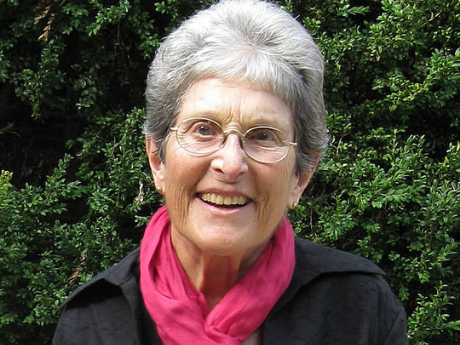First Loves
Maxine Kumin: First Loves

from The Vision of Sir Launfal
And what is so rare as a day in June?
Then, if ever, come perfect days;
Then Heaven tries the earth if it be in tune,
And over it softly her warm ear lays:
Whether we look, or whether we listen,
We hear life murmur, or see it glisten;
Every clod feels a stir of might,
An instinct within it that reaches and towers,
And, groping blindly above it for light,
Climbs to a soul in grass and flowers;
The flush of life may well be seen
Thrilling back over hills and valleys;
The cowslip startles in meadows green,
The buttercup catches the sun in its chalice,
And there's never a leaf nor a blade too mean
To be some happy creature's palace;
The little bird sits at his door in the sun,
Atilt like a blossom among the leaves,
And lets his illumined being o'errun
With the deluge of summer it receives;
His mate feels the eggs beneath her wings,
And the heart in her dumb breast flutters and sings;
He sings to the wide world, and she to her nest,—
In the nice ear of Nature which song is the best?
In grammar school when I was in the fourth or fifth grade, Miss Blomberg exhorted us to memorize work by such sterling American poets as Longfellow, Whittier, and Lowell. Gold stars were given out to those who could rise, face the class, and recite flawlessly, or nearly so, parts of "Tell me not, in mournful numbers / Life is but an empty dream" or "Blessings on thee, little man, / Barefoot boy with cheek of tan!" or, in my case, a sizable chunk of James Russell Lowell's "The Vision of Sir Launfal."
It is true that I had already learned by heart some of Robert Louis Stevenson's A Child's Garden of Verses, but these were accidental acquisitions from reading and rereading. While I enjoyed having them in my head they did not perplex and stir me as Sir Launfal did. The part I chose to declaim, at Miss Blomberg's bidding, begins: "And what is so rare as a day in June?" It is Wordsworthian in its romantic fervor, hypnotic in its exact tetrameter, and here and there, departs from its "June/tune" monosyllables to rhyme "glisten" with "listen," "chalice" with "palace." Of course I had no idea what a chalice was, but it sounded delicious. The "cowslips that fluttered in meadows green" were equally foreign to me; about thirty years later I discovered, picked, and cooked marsh marigolds, as they are known in New England.
But what gave me goosebumps was the description of the two birds, the male who "sits at his door in the sun" and the female who "feels the eggs beneath her wings / And the heart in her dumb breast flutters and sings...." The concluding couplet tapped out its rhythm so satisfyingly that I felt an unreasonable exaltation: "He sings to the wide world, and she to her nest--/ In the nice ear of Nature which songs is the best?" "The nice ear of Nature"--how I reveled in the sound of it, and in the benevolence of this sunny, attentive mother. All was right with the world.
After my triumph with this 24-line section, I went back and set about learning by rote the stanza that precedes it, the one where "The beggar is taxed for a corner to die in" and "At the devil's booth are all things sold...." The cadences were the same but the magic was missing. "We bargain for the graves we lie in" terrified me and I quickly abandoned the project. Miss Blomberg's gold stars were not the kind that are pasted in the middle of the forehead. Hers were solid cutouts, painted with a gritty gold paint. I treasured mine until the paint flecks began to fall off, revealing plain brown cardboard beneath. But nothing tarnished the sturdy four-beat lines so gratifyingly end-stopped that they thumped in my head. Nothing soothed me so well as "Then, if ever, come perfect days...."
I think we internalize the poems we have by heart and they operate by osmosis to influence the writers we become. I favor the iambic tetrameter line, instilled in me by James Russell Lowell and sharpened by my later infatuation with Auden. Mostly, though, I am grateful for those old-fashioned teachers who revered the poems of a bygone era and by exacting from us our twenty-odd lines a week gave us an inner library to draw on for the rest of our lives.
Originally published in Crossroads, Spring 1998.


